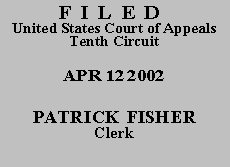

| SHIRLEY N. HILL,
Plaintiff - Appellant, v. JOANNE B. BARNHART,(*) Commissioner of Social Security Administration, Defendant - Appellee. |
|
Claimant applied for benefits on March 13, 1997, alleging an inability to work after June 24, 1996, due to pain in her back, leg, hip, and stomach, difficulty sleeping, and blurred vision. After a hearing at which both claimant and a vocational expert testified, the administrative law judge (ALJ) found that although claimant could not return to her former work, she retained the ability to perform a wide range of light work and thus was not disabled. The Appeals Council denied review, and the district court affirmed. Claimant appeals.
We review the Commissioner's decision to determine only whether it is supported by substantial evidence and whether the correct legal standards were applied. Goatcher v. United States Dep't of Health & Human Servs., 52 F.3d 288, 289 (10th Cir. 1995). Substantial evidence is adequate relevant evidence that a reasonable mind might accept to support a conclusion. Kelley v. Chater, 62 F.3d 335, 337 (10th Cir. 1995). We may not reweigh the evidence or substitute our judgment for that of the agency. Id.
Claimant argues that the ALJ erred by failing to properly evaluate her subjective complaints of disabling pain. In evaluating a claimant's complaints of pain, the ALJ must consider factors such as the levels of medication taken by claimant and their effectiveness, the extensiveness of claimant's attempts (medical or nonmedical) to obtain relief, the frequency of claimant's medical contacts, the nature of her daily activities, subjective measures of credibility, the motivation of and relationship between claimant and other witnesses, and the consistency or compatibility of claimant's testimony with the objective medical evidence. Kepler v. Chater, 68 F.3d 387, 391 (10th Cir. 1995).
"Credibility determinations are peculiarly the province of the finder of fact," and should not be upset if supported by substantial evidence. Id. (quotation omitted). The opportunity to observe and evaluate the demeanor of a witness in cases like this "is invaluable, and should not be discarded lightly. Therefore, special deference is traditionally afforded a trier of fact who makes a credibility finding." Williams v. Bowen, 844 F.2d 748, 755 (10th Cir. 1988) (quotation and citations omitted).
Our review of the record reveals that the ALJ considered a number of specific factors in assessing claimant's credibility. His decision explains that he found claimant's allegation of disabling pain to be not totally credible because it was not consistent with the objective medical evidence regarding her limitations, was not consistent with her daily activities, and was not consistent with her demeanor at the hearing. He questioned her credibility in reporting constant pain rated at ten out of a scale of one to ten because her pain did not affect her ability to care for herself or require significant changes in her daily activities. The ALJ also noted that the record showed claimant was able to get relief from her medications and that no doctor had opined that claimant was unable to work. Finally, the ALJ questioned claimant's testimony regarding blurred vision because she failed to mention it to any of her treating physicians, and questioned her complaints of liver and/or gallbladder disease because she had not been diagnosed with these conditions.
While we have insisted that the ALJ provide an objectively reasonable explanation for his credibility determination, we have not reduced credibility evaluations to formulaic expressions: "Kepler does not require a formalistic factor-by-factor recitation of the evidence. So long as the ALJ sets forth the specific evidence he relies on in evaluating the claimant's credibility, the dictates of Kepler are satisfied." Qualls v. Apfel, 206 F.3d 1368, 1372 (10th Cir. 2000). Because here the ALJ linked his credibility determination to a number of specific findings which are fairly derived from the record, we are compelled to accept that determination.
ENTERED FOR THE COURT
Circuit Judge
*. On November 9, 2001, JoAnne B. Barnhart became the Commissioner of Social Security. In accordance with Rule 43(c)(2) of the Federal Rules of Appellate Procedure, Ms. Barnhart is substituted for Larry G. Massanari as the appellee in this action
2. The case is unanimously ordered submitted without oral argument according to the parties' request for a decision on the briefs and pursuant to Fed. R. App. P. 34(f) and 10th Cir. R. 34.1(G). This order and judgment is not binding precedent, except under the doctrines of law of the case, res judicata, and collateral estoppel. The Court generally disfavors the citation of orders and judgments; nevertheless, an order and judgment may be cited under the terms and conditions of 10th Cir. R. 36.3.